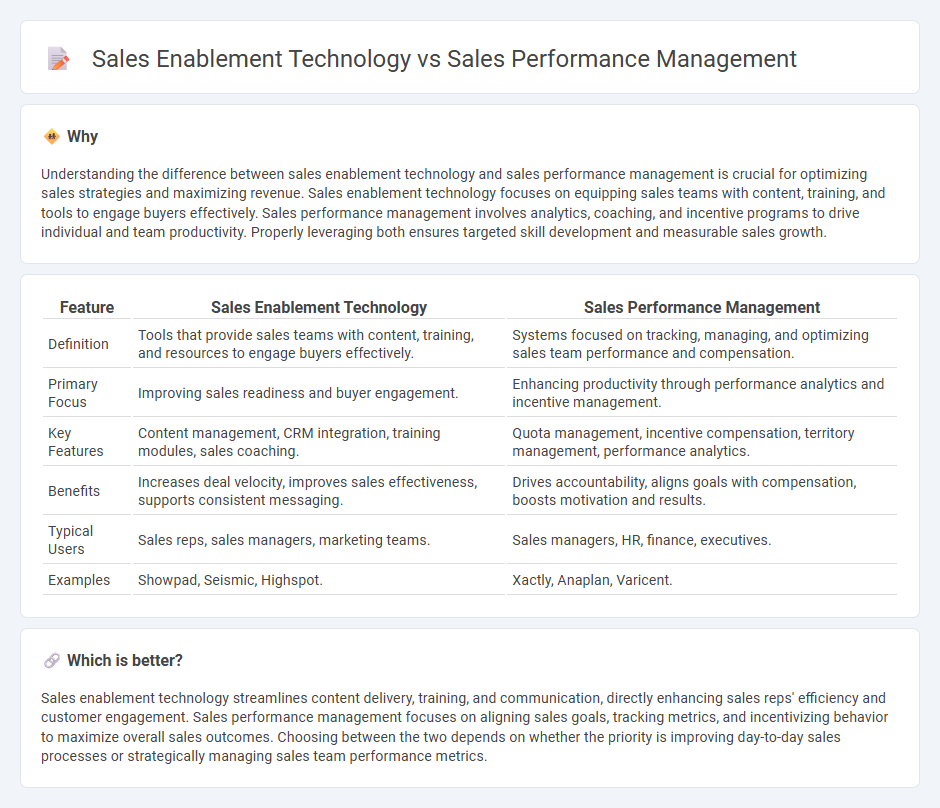
Sales enablement technology focuses on equipping sales teams with tools, content, and training to improve engagement and efficiency during the sales cycle. Sales performance management solutions concentrate on setting quotas, tracking key performance indicators (KPIs), and optimizing compensation plans to boost overall sales outcomes. Discover how these technologies can transform your sales strategy for maximum impact.
Why it is important
Understanding the difference between sales enablement technology and sales performance management is crucial for optimizing sales strategies and maximizing revenue. Sales enablement technology focuses on equipping sales teams with content, training, and tools to engage buyers effectively. Sales performance management involves analytics, coaching, and incentive programs to drive individual and team productivity. Properly leveraging both ensures targeted skill development and measurable sales growth.
Comparison Table
| Feature | Sales Enablement Technology | Sales Performance Management |
|---|---|---|
| Definition | Tools that provide sales teams with content, training, and resources to engage buyers effectively. | Systems focused on tracking, managing, and optimizing sales team performance and compensation. |
| Primary Focus | Improving sales readiness and buyer engagement. | Enhancing productivity through performance analytics and incentive management. |
| Key Features | Content management, CRM integration, training modules, sales coaching. | Quota management, incentive compensation, territory management, performance analytics. |
| Benefits | Increases deal velocity, improves sales effectiveness, supports consistent messaging. | Drives accountability, aligns goals with compensation, boosts motivation and results. |
| Typical Users | Sales reps, sales managers, marketing teams. | Sales managers, HR, finance, executives. |
| Examples | Showpad, Seismic, Highspot. | Xactly, Anaplan, Varicent. |
Which is better?
Sales enablement technology streamlines content delivery, training, and communication, directly enhancing sales reps' efficiency and customer engagement. Sales performance management focuses on aligning sales goals, tracking metrics, and incentivizing behavior to maximize overall sales outcomes. Choosing between the two depends on whether the priority is improving day-to-day sales processes or strategically managing sales team performance metrics.
Connection
Sales enablement technology equips sales teams with tools, content, and training designed to boost productivity and improve customer engagement. Sales performance management integrates data analytics, goal-setting, and incentive programs to track and enhance sales outcomes. Together, these systems create a unified framework that optimizes sales processes and drives revenue growth.
Key Terms
**Sales Performance Management:**
Sales Performance Management (SPM) technology optimizes sales processes through data-driven analytics, quota setting, incentive compensation, and performance tracking to maximize revenue. It provides comprehensive visibility into sales metrics, enabling organizations to align sales strategies with business goals effectively. Explore the key benefits and features of SPM to enhance your sales operations and drive growth.
Quota Attainment
Sales performance management (SPM) centers on setting, tracking, and optimizing quota attainment through analytics, incentive compensation, and performance coaching, while sales enablement technology equips sales teams with content, training, and tools to execute sales strategies effectively. SPM solutions provide data-driven insights to identify gaps in quota achievement and drive accountability, whereas enablement platforms foster skill development and resource accessibility that indirectly influence quota success. Explore how integrating SPM and sales enablement technologies can maximize quota attainment and elevate overall sales efficacy.
Incentive Compensation
Sales performance management (SPM) centers on automating and optimizing incentive compensation plans to align sales behaviors with business goals, ensuring accurate and timely payouts that motivate sales teams effectively. Sales enablement technology supports the sales process by providing tools and content that aid sales reps in engaging prospects, but lacks the in-depth financial and analytics capabilities critical to managing incentive compensation schemes. Explore more to understand how integrating these technologies can drive both motivation and productivity in your sales organization.
Source and External Links
What Is Sales Performance Management? - Sales performance management (SPM) is a process used by sales organizations to track, manage, and improve the work of their sales teams, involving key components like sales planning, compensation, incentives, quota management, and territory planning for aligning goals and boosting motivation.
What Is Sales Performance Management (SPM)? A Guide ... - SPM involves establishing clear goals and KPIs tailored to an organization's needs, building a strategy that includes hiring, onboarding, training, pipeline optimization, and usage of sales software for improving sales outcomes.
What is Sales Performance Management (SPM)? - SPM is a structured system that includes real-time sales tracking, dashboards, benchmarking against industry standards, and data-driven insights to enable timely decisions, coaching, and continuous sales improvement.
 dowidth.com
dowidth.com